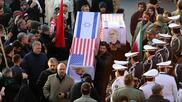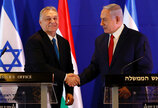7 feb 2020

An Israeli airstrike, carried out as Syria troops were liberating the terrorist-held town of Saraqib in northwestern Idlib province, has endangered a civilian flight carrying 172 passengers, according to the Russian Defense Ministry.
Defense Ministry spokesman Major General Igor Konashenkov said Friday the civil Airbus-320 was heading to Damascus from the Iranian capital early Thursday when it was forced to divert its route as the Syrian capital's air defenses were intercepting Israeli missiles.
The plane made an emergency landing in the Hmeymim air base in Syria's western coastal province of Latakia.
“Only due to timely actions of the Damascus airport dispatchers and the efficient operation of the automated air traffic control system, the Airbus-320 managed to… successfully land at the closest alternative airfield,” Konashenkov said.
'Israel using passenger jets as shields'
The spokesman stressed that Israel was well aware of civilian flights around Damascus and that such missions demonstrated the regime's reckless disregard for human lives.
"The Israeli general staff's use of passenger jets as a cover for its military operations or as a shield from Syrian missile system fire is becoming a typical trait of Israeli air force," he said.
Russia had previously warned that Israeli airstrikes against Damascus were endangering civilian jets.
Lebanese officials have also stated that Israeli jets illegally conducting operations against Syria from the country's airspace pose a danger to civilian aircraft in Lebanon.
In 2018, Syrian air defenses mistakenly shot down a Russian Ilyushin Il-20 reconnaissance plane after it was similarly used as a cover by Israeli warplanes, killing 15 people on board.
Syria: Saraqib fully liberated
The Israeli airstrikes took place as Syrian troops were entering the terrorist-controlled town of Saraqib, which lies at the crossroads of two key highways in the Idlib province, the last major terrorist bastion in Syria.
The town has currently been fully liberated by Syrian forces.
Damascus has highlighted that the Israeli airstrike on Thursday happened at the same time the Turkish military was deploying a military caravan in Idlib to "protect the terrorists" and halt the Syrian military advance in the province.
Damascus has slammed the operation as evidence of Tel Aviv and Ankara's coordinated support for the terrorists.
Israel is known for conducting airstrikes against Damascus during major Syrian military advancements.
The reported joint Israeli-Turkish operations in Syria come as Ankara - which has also been a major backer for terrorists in Syria - has warned that it may resort to military action if Syria does not withdraw its troops battling terrorist forces in Idlib until the end of February.
The ongoing Syrian army offensive in Idlib was launched last August after terrorists failed to honor the Sochi de-escalation zone agreement brokered between Russian and Turkey in September 2018.
Large swathes of the province have since been liberated by Syrian troops.
Tehran offers mediation, stresses political resolution
Iran's Ambassador to the United Nations Majid Takht-Ravanchi said Iran, as a main party to the Astana peace process, was ready to help solve disputes between Damascus and Ankara regarding the Idlib province.
"We have to guarantee that this crisis is solved politically while at the same time prohibiting terrorists from using this as an opportunity to fortify their positions, turn Idlib into a safe refuge and target more civilians," he said.
"We have to be aware that the goal of protecting civilians doesn't get replaced with protecting terrorists," he added.
The UN envoy added that an Astana meeting, which is planned to be held in the near future in Tehran, provides a "indispensable opportunity" to resolve issues related to the Syria conflict.
The Astana peace process was launched by Iran, Turkey and Russia in 2017 and had a major role in reducing violence in the country by agreeing to de-escalation zones in the war-wracked country.
Defense Ministry spokesman Major General Igor Konashenkov said Friday the civil Airbus-320 was heading to Damascus from the Iranian capital early Thursday when it was forced to divert its route as the Syrian capital's air defenses were intercepting Israeli missiles.
The plane made an emergency landing in the Hmeymim air base in Syria's western coastal province of Latakia.
“Only due to timely actions of the Damascus airport dispatchers and the efficient operation of the automated air traffic control system, the Airbus-320 managed to… successfully land at the closest alternative airfield,” Konashenkov said.
'Israel using passenger jets as shields'
The spokesman stressed that Israel was well aware of civilian flights around Damascus and that such missions demonstrated the regime's reckless disregard for human lives.
"The Israeli general staff's use of passenger jets as a cover for its military operations or as a shield from Syrian missile system fire is becoming a typical trait of Israeli air force," he said.
Russia had previously warned that Israeli airstrikes against Damascus were endangering civilian jets.
Lebanese officials have also stated that Israeli jets illegally conducting operations against Syria from the country's airspace pose a danger to civilian aircraft in Lebanon.
In 2018, Syrian air defenses mistakenly shot down a Russian Ilyushin Il-20 reconnaissance plane after it was similarly used as a cover by Israeli warplanes, killing 15 people on board.
Syria: Saraqib fully liberated
The Israeli airstrikes took place as Syrian troops were entering the terrorist-controlled town of Saraqib, which lies at the crossroads of two key highways in the Idlib province, the last major terrorist bastion in Syria.
The town has currently been fully liberated by Syrian forces.
Damascus has highlighted that the Israeli airstrike on Thursday happened at the same time the Turkish military was deploying a military caravan in Idlib to "protect the terrorists" and halt the Syrian military advance in the province.
Damascus has slammed the operation as evidence of Tel Aviv and Ankara's coordinated support for the terrorists.
Israel is known for conducting airstrikes against Damascus during major Syrian military advancements.
The reported joint Israeli-Turkish operations in Syria come as Ankara - which has also been a major backer for terrorists in Syria - has warned that it may resort to military action if Syria does not withdraw its troops battling terrorist forces in Idlib until the end of February.
The ongoing Syrian army offensive in Idlib was launched last August after terrorists failed to honor the Sochi de-escalation zone agreement brokered between Russian and Turkey in September 2018.
Large swathes of the province have since been liberated by Syrian troops.
Tehran offers mediation, stresses political resolution
Iran's Ambassador to the United Nations Majid Takht-Ravanchi said Iran, as a main party to the Astana peace process, was ready to help solve disputes between Damascus and Ankara regarding the Idlib province.
"We have to guarantee that this crisis is solved politically while at the same time prohibiting terrorists from using this as an opportunity to fortify their positions, turn Idlib into a safe refuge and target more civilians," he said.
"We have to be aware that the goal of protecting civilians doesn't get replaced with protecting terrorists," he added.
The UN envoy added that an Astana meeting, which is planned to be held in the near future in Tehran, provides a "indispensable opportunity" to resolve issues related to the Syria conflict.
The Astana peace process was launched by Iran, Turkey and Russia in 2017 and had a major role in reducing violence in the country by agreeing to de-escalation zones in the war-wracked country.
6 feb 2020

Syrian Observatory for Human Rights reports that at least 3 of the victims from the pre-dawn raid were Iranian nationals; earlier reports placed the number of fatalities at only 12
At least 23 people were killed in Syria in a Thursday pre-dawn raid, attributed to Israel, said a war monitoring group. Three of the victims are reported to be Iranian nationals.
The Syrian Observatory for Human Rights said at least 15 of those killed belonged to pro-Iranian militias operating in the country and eight of the victims were part of the official Syrian army.
Earlier reports placed the number of fatalities at only 12.
A few hours before the attack, an Iranian cargo plane operated by Tehran-based Saha Airlines - owned by the Islamic Revolutionary Guard - was spotted making its way back from Damascus to the Iranian capital.
The aircraft flying along the route that in the past was used to transport arms from Iran to Syria.
The state news agency SANA said the Syrian air defenses shot down most of the missiles in the suburbs of the capital and the country's south before they reached their targets. It said the Israeli warplanes fired the missiles while flying over the Israeli-occupied Golan Heights and neighboring Lebanon.
The Britain-based Syrian Observatory for Human Rights, which tracks the Syrian war through a network of activists on the ground, said the airstrikes that occurred after midnight on Wednesday.
They hit Syrian army positions and those of Iranian-backed militiamen west and south of the capital, as well as the Mazzeh military airbase in Damascus. the Observatory said.
A "large number of missiles" hit multiple positions in these areas, triggering a fire at the Scientific Research Center in the Damascus suburb of Jamraya. The Observatory said the strikes inflicted casualties but had no definitive figure.
There was no immediate comment from Israel.
At least 23 people were killed in Syria in a Thursday pre-dawn raid, attributed to Israel, said a war monitoring group. Three of the victims are reported to be Iranian nationals.
The Syrian Observatory for Human Rights said at least 15 of those killed belonged to pro-Iranian militias operating in the country and eight of the victims were part of the official Syrian army.
Earlier reports placed the number of fatalities at only 12.
A few hours before the attack, an Iranian cargo plane operated by Tehran-based Saha Airlines - owned by the Islamic Revolutionary Guard - was spotted making its way back from Damascus to the Iranian capital.
The aircraft flying along the route that in the past was used to transport arms from Iran to Syria.
The state news agency SANA said the Syrian air defenses shot down most of the missiles in the suburbs of the capital and the country's south before they reached their targets. It said the Israeli warplanes fired the missiles while flying over the Israeli-occupied Golan Heights and neighboring Lebanon.
The Britain-based Syrian Observatory for Human Rights, which tracks the Syrian war through a network of activists on the ground, said the airstrikes that occurred after midnight on Wednesday.
They hit Syrian army positions and those of Iranian-backed militiamen west and south of the capital, as well as the Mazzeh military airbase in Damascus. the Observatory said.
A "large number of missiles" hit multiple positions in these areas, triggering a fire at the Scientific Research Center in the Damascus suburb of Jamraya. The Observatory said the strikes inflicted casualties but had no definitive figure.
There was no immediate comment from Israel.
12 jan 2020

NBC News says Jerusalem 'helped confirm the details' of Iran's general secret flight from Damascus to Baghdad, where his vehicle was struck by drones upon arrival; earlier, top IDF official claimed Israel was 'not the story' of the operation
Israeli intelligence was used by the United States in a mission to assassinate a top Iranian general, NBC News reported Sunday.
Gen. Qassem Soleimani, the head of Iran's elite Quds force and mastermind of its regional security strategy, was killed in an airstrike a week ago near the Iraqi capital's international airport.
Iran struck back at the Americans days later by firing a series of ballistic missiles at two military bases in Iraq housing American troops. There were no reported American casualties.
According to the report, Israeli intelligence "helped confirm the details" of Soleimani's Cham Wings Airbus A320 flight from the Syrian capital of Damascus to Baghdad on January 3.
Neither Soleimani nor the soldiers were registered on the passenger manifesto, according to a Cham Wings airline employee.
Despite the high level of secrecy, once the general had landed in Iraqi capital, rockets fired from a U.S. drone killed him as he left the airport in a convoy of two armored vehicles.
Citing interviews with two officials with direct knowledge of the operation, NBC News says that initially informants at the Damascus airport provided intelligence on Soleimani's flight to Baghdad.
In Iraq's capital, American spies pinpointed the location of the jet carrying Soleimani, his meeting with an Iraqi ally at the runway broadcast live for U.S. officials across the globe to watch.
At this point, three U.S. drones were already hovering up above, armed with Hellfire missiles and ready to eliminate a man who, according to President Donald Trump, was planning attacks on four U.S. embassies.
With little traffic on Baghdad's roads, Soleimani's convoy - one sedan carrying the general and Abu Mahdi al-Muhandis (founder of Kata'ib Hezbollah militias) and a minivan with their entourage - headed out and went up in flames after four missiles were launched from the drones.
The report gave no further details on the extent of Jerusalem's alleged involvement in the operation.
GOC Southern Command Maj. Gen. Herzi Halevi last Monday distanced Israel from the killing of the general, saying Israelis “are not the story here.”
Israeli intelligence was used by the United States in a mission to assassinate a top Iranian general, NBC News reported Sunday.
Gen. Qassem Soleimani, the head of Iran's elite Quds force and mastermind of its regional security strategy, was killed in an airstrike a week ago near the Iraqi capital's international airport.
Iran struck back at the Americans days later by firing a series of ballistic missiles at two military bases in Iraq housing American troops. There were no reported American casualties.
According to the report, Israeli intelligence "helped confirm the details" of Soleimani's Cham Wings Airbus A320 flight from the Syrian capital of Damascus to Baghdad on January 3.
Neither Soleimani nor the soldiers were registered on the passenger manifesto, according to a Cham Wings airline employee.
Despite the high level of secrecy, once the general had landed in Iraqi capital, rockets fired from a U.S. drone killed him as he left the airport in a convoy of two armored vehicles.
Citing interviews with two officials with direct knowledge of the operation, NBC News says that initially informants at the Damascus airport provided intelligence on Soleimani's flight to Baghdad.
In Iraq's capital, American spies pinpointed the location of the jet carrying Soleimani, his meeting with an Iraqi ally at the runway broadcast live for U.S. officials across the globe to watch.
At this point, three U.S. drones were already hovering up above, armed with Hellfire missiles and ready to eliminate a man who, according to President Donald Trump, was planning attacks on four U.S. embassies.
With little traffic on Baghdad's roads, Soleimani's convoy - one sedan carrying the general and Abu Mahdi al-Muhandis (founder of Kata'ib Hezbollah militias) and a minivan with their entourage - headed out and went up in flames after four missiles were launched from the drones.
The report gave no further details on the extent of Jerusalem's alleged involvement in the operation.
GOC Southern Command Maj. Gen. Herzi Halevi last Monday distanced Israel from the killing of the general, saying Israelis “are not the story here.”
9 jan 2020

Hungarian PM says European Union 'not clear on Iranian issue'; says his country will keep troops in Iraq as long as Baghdad abides by agreement between the two governments
Hungary wants the European stance on the U.S.-Iran conflict to be closer that held by the Unites States, Hungarian Prime Minister Viktor Orban said on Thursday.
The European Union's foreign ministers meet on Friday in Brussels to discuss the Iran crisis, with a focus on easing tensions between Washington and Tehran.
"I would like for the European stance, which is not clear on this Iranian issue, to be oriented towards the Israeli-United States stance," Orban told a news conference.
Orban has warm relations with Prime Minister Benjamin Netanyahu.
"You stand up for Israel and you stand up for the truth and I want to thank you for it," Netanyahu said during a visit to Jerusalem by Orban last year.
"It is a very important alliance," Netanyahu said of the relationship between Hungary and Israel.
European Council President Charles Michel said on Thursday he had spoken to Iranian President Hassan Rouhani and urged Tehran to comply with a 2015 arms control agreement with world powers to curb its nuclear ambitions. Iran denies seeking nuclear weapons.
Meanwhile U.S. President Donald Trump on Wednesday urged world powers to quit the accord that Washington abandoned in 2018 and work for a new deal. Iran has rejected new talks.
Orban, who has frequently chafed at EU policy, met Trump last year, when Trump lauded him for being tough on immigration, a policy area in which the two leaders have similar visions.
The prime minister also said Thursday that his country will keep its troops stationed in Iraq as long as Baghdad abides by the agreement between the two governments.
Orban told reporters that plans were in place should the Hungarian troops need to be evacuated, which would take place “immediately” if Iraq pulls out of the agreement.
Hungary has been member of NATO since 1999 and currently has about 150 troops in Iraq’s Kurdish region.
Hungarian troops are deployed in several international missions around the world, carrying out mostly tasks like peacekeeping and partnership building.
Hungary wants the European stance on the U.S.-Iran conflict to be closer that held by the Unites States, Hungarian Prime Minister Viktor Orban said on Thursday.
The European Union's foreign ministers meet on Friday in Brussels to discuss the Iran crisis, with a focus on easing tensions between Washington and Tehran.
"I would like for the European stance, which is not clear on this Iranian issue, to be oriented towards the Israeli-United States stance," Orban told a news conference.
Orban has warm relations with Prime Minister Benjamin Netanyahu.
"You stand up for Israel and you stand up for the truth and I want to thank you for it," Netanyahu said during a visit to Jerusalem by Orban last year.
"It is a very important alliance," Netanyahu said of the relationship between Hungary and Israel.
European Council President Charles Michel said on Thursday he had spoken to Iranian President Hassan Rouhani and urged Tehran to comply with a 2015 arms control agreement with world powers to curb its nuclear ambitions. Iran denies seeking nuclear weapons.
Meanwhile U.S. President Donald Trump on Wednesday urged world powers to quit the accord that Washington abandoned in 2018 and work for a new deal. Iran has rejected new talks.
Orban, who has frequently chafed at EU policy, met Trump last year, when Trump lauded him for being tough on immigration, a policy area in which the two leaders have similar visions.
The prime minister also said Thursday that his country will keep its troops stationed in Iraq as long as Baghdad abides by the agreement between the two governments.
Orban told reporters that plans were in place should the Hungarian troops need to be evacuated, which would take place “immediately” if Iraq pulls out of the agreement.
Hungary has been member of NATO since 1999 and currently has about 150 troops in Iraq’s Kurdish region.
Hungarian troops are deployed in several international missions around the world, carrying out mostly tasks like peacekeeping and partnership building.

The legislation puts into law 'Memorandum of Understanding' reached between Israelis and Americans 4 years ago; the bill was rushed due to growing tensions in the Mideast and includes provision that bans boycotting Israel
Republican and Democratic U.S. senators introduced legislation on Thursday to provide $3.3 billion in annual aid to Israel, seeking to put into law an aid agreement between the two countries reached in 2016 amid concern over rising Middle East tensions.
Republican Senator Marco Rubio and Democratic Senator Chris Coons co-sponsored the bill, a standalone provision of a broader measure that stalled a year ago.
The measure that stalled last year included some provisions broadly supported by members of both parties, including the aid, but it also included a plank that would have let state and local governments punish Americans for boycotting Israel.
Opponents, including many Democrats, saw that provision as an impingement of free speech.
Rubio and Coons introduced the bill amid increased tensions in the Middle East after President Donald Trump ordered a drone strike that killed Iranian military commander Qassem Soleimani and Tehran retaliated with a missile attack on an Iraqi base housing U.S. soldiers.
On Thursday, the region remained on edge as Iran spurned Trump's call for a new nuclear pact and its commanders threatened more attacks.
The bill would put into law a "Memorandum of Understanding" reached between Israel and the Obama administration from four years ago that was the biggest pledge of U.S. military assistance made to any country.
In statements emailed to Reuters, Rubio said Israel faces "unprecedented threats" and Coons said: "The events of the past few days are a stark reminder of the importance of U.S. assistance to Israel's security."
Republican and Democratic U.S. senators introduced legislation on Thursday to provide $3.3 billion in annual aid to Israel, seeking to put into law an aid agreement between the two countries reached in 2016 amid concern over rising Middle East tensions.
Republican Senator Marco Rubio and Democratic Senator Chris Coons co-sponsored the bill, a standalone provision of a broader measure that stalled a year ago.
The measure that stalled last year included some provisions broadly supported by members of both parties, including the aid, but it also included a plank that would have let state and local governments punish Americans for boycotting Israel.
Opponents, including many Democrats, saw that provision as an impingement of free speech.
Rubio and Coons introduced the bill amid increased tensions in the Middle East after President Donald Trump ordered a drone strike that killed Iranian military commander Qassem Soleimani and Tehran retaliated with a missile attack on an Iraqi base housing U.S. soldiers.
On Thursday, the region remained on edge as Iran spurned Trump's call for a new nuclear pact and its commanders threatened more attacks.
The bill would put into law a "Memorandum of Understanding" reached between Israel and the Obama administration from four years ago that was the biggest pledge of U.S. military assistance made to any country.
In statements emailed to Reuters, Rubio said Israel faces "unprecedented threats" and Coons said: "The events of the past few days are a stark reminder of the importance of U.S. assistance to Israel's security."
